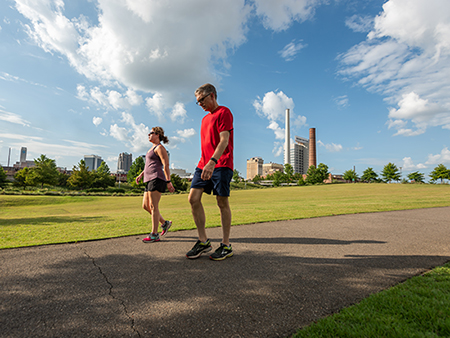Media contact: Anna Jones
 May is National Physical Fitness and Sports Month and Mental Health Awareness Month. UAB physicians offer tips for how to maintain a healthy mind and body.
May is National Physical Fitness and Sports Month and Mental Health Awareness Month. UAB physicians offer tips for how to maintain a healthy mind and body.
(Photo by: Brit Huckabay)With so much information available on how to keep healthy and fit, it can be overwhelming to focus on the best way to take care of yourself.
May is both National Physical Fitness and Sports Month and Mental Health Awareness Month. UAB Medicine specialists in the University of Alabama at Birmingham’s Department of Family and Community Medicine say that physical health and mental health go hand-in-hand. Maintaining a healthy mind and a healthy body share many of the same best practices. Physical activity and exercise play a vital role in overall health and wellness, including mental health.
As summer approaches, explore new ways to stay healthy with these physical activity and wellness tips from the Department of Family and Community Medicine.
Tip one: Get up and out, every day
Ian McKeag, M.D., program director for the UAB-Cahaba Sports Medicine Fellowship and assistant professor in the department, tells patients to set a goal and move their bodies for a set amount of time each day.
“Not everyone has the time or the finances to join a gym, but nearly everyone can walk,” McKeag said. “Tell yourself that you are going to be out of the house or active for a least 30-60 minutes per day, and stick to that goal.”
McKeag notes that setting a time-based goal helps his patients improve mobility over time and encourages physical activity in an accessible way.
Tip two: Being active counts
“Remember that being active counts as exercise,” said Kim Fagan, M.D., associate professor and chief of the department’s sports medicine division. “Work in the garden, take the stairs at work, do squats while you talk on the phone or complete a simple arm workout while watching the news.”
Fagan encourages her patients to have an active mindset and reminds them that small activities throughout the day add up to increase physical strength and health.
Tip three: Build habits to support mental health
According to Kaylee Crockett, Ph.D., assistant professor and clinical psychologist, many people have gotten more creative about their physical activity routine during the pandemic.
“Studies have shown that individuals of all ages who maintained or increased their physical activity during the pandemic reported less anxiety and depressive symptoms, and a greater sense of well-being,” Crockett said.
By prioritizing physical activity and exercise, Crockett says, people can improve their mental health and general outlook.
“Now is a good time to reflect on what works well in terms of physical activity, especially as we transition back to ‘normal’ in the coming months,” she said. “Routines like the make-shift home gym, lunch hour walks or activity breaks, and increased outdoor time are worth keeping as ways to improve and maintain mental health.”
Tip four: Find something you enjoy (and hydrate!)
Irfan Asif, M.D., chair of the Department of Family and Community Medicine, asks his patients what they enjoy when encouraging increased physical activity.
“Don’t let yourself get discouraged if you don’t like a certain type of exercise,” Asif said. “The most important part of physical activity and exercise is staying active doing things you enjoy and trying new things to keep yourself motivated.”
Asif also reminds his patients and others to stay hydrated while completing workouts or outdoor activities. He recommends drinking water every 15 minutes during an hour of exercise and drinking a beverage with electrolytes if the activity exceeds an hour, especially during the summer.